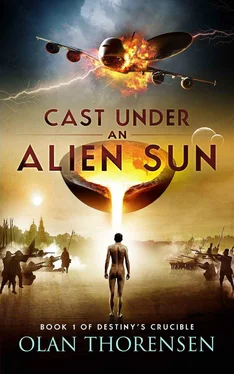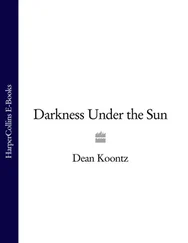Yozef paid Linwyr one hundred krun to show him, Cadwulf, and Filtin the pools. On horseback, they followed the road into Gwillamer from Abersford, about twenty-four miles to where they left the main road and wound their horses into a marshy area a few miles from the sea. It was the longest horseback ride Yozef had made, and for the last few miles, he couldn’t get out of his mind the joke line “‘Fifty Days in the Saddle’ by Major Assburns.” He now appreciated the reference more, though the humor was lost in his present condition.
They smelled the pools before they saw them.
“Thank you, God or whomever!” Yozef exclaimed in English, as he gingerly dismounted next to an odious-looking pool with a skim of water covering the seep. Sulfurous odors came and went with the breeze off the water. The pool was both encouraging and discouraging. Encouraging, in that it existed at all, showing that surface petroleum did exist on Caedellium; discouraging, in that the pool was only three feet in diameter. Linwyr assured him that larger pools were nearby.
“I’m walking for a while to rest Seabiscuit,” Yozef asserted. Cadwulf objected, Carnigan smirked, and Linwyr grunted. They walked, Yozef slightly bowlegged at first.
They found several small pools in the next hour, and Yozef was about to give up when they hit pay dirt. Before them, in a shallow valley, lay a crude oil seep a hundred yards across.
“This is more like it,” said Yozef, kneeling down to inspect the crude. While any grade of petroleum could be used, the heavier grades would be useless in the foreseeable future, given the available level of technology and infrastructure. Yozef stirred the crude with a dead tree branch and got below the surface layer.
“Good, good,” he said. “This will work fine.” It looked like what was called “light-sweet” grade on Earth. If he was right, there’d be less of the heavier, more difficult to work with fractions and a high percentage of the lighter molecules. Benzene would come off early, and they could let it blow away—no worry about the Environmental Protection Agency (EPA) rules here. Then, 30 to 50 percent of the total would distill off as kerosene.
They probed the seep and found an average depth of three feet at six feet from the edge. Assuming the depth increased toward the center of the pool and the depression, there was enough petroleum to supply production until they found out whether kerosene would succeed as a product. If it did, they might have to drill, though it wasn’t something to worry about, yet.
“Linwyr,” questioned Yozef, “would it be a problem in either buying this land here in Gwillamer or in taking the crude?”
“We’d have to check with the local district center,” said the trader, “but I don’t think there will be any problem. Customs and laws in Gwillamer are similar to Keelan. Give me a couple of days, and I should be able to find out. Of course, my time is valuable, and who knows what unexpected problems might occur.”
After some dickering, it was agreed Linwyr would receive a percentage of profits from the Gwillamer petroleum. Yozef figured that giving Linwyr a small share in any profits, in exchange for his dealing with the Gwillamese, better ensured Linwyr’s dedication to the project than salary. Approval to take the oil came the next sixday, details about which Yozef never inquired, as long as the petroleum was available.
With paperwork in hand that Linwyr said authorized them to collect unlimited petroleum, the next two steps were how to get the oil to where it could be processed and distilled. Logistically, setting up the distillation at the source would have been more efficient, but at the beginning it would have to be in Abersford, where there were already shops and workmen. Yozef put Linwyr in charge of getting the petroleum to Abersford, and Filtin with working out the distillation.
Linwyr’s solution to getting the oil from the Gwillamer pools to Abersford was simple. A wooden tanker wagon was built that would hold twelve hundred gallons. The bed of the wagon was a wooden box with no lid, the crude also serving as caulking for the wood. Once full, the top of the bed was covered with canvas to keep out dust and critters. How Linwyr got the oil from the pools to the box Yozef never asked. A six-horse team pulled the wagon, and once it arrived in Abersford, the wagon was rolled over a basin dug into the ground and lined with brick, a “cork” built into the bottom of the wagon bed was knocked out, and the crude drained into the basin. The cork was then replaced, and wagon returned to Gwillamer for another load. Yozef cringed, as he watched the first load empty into the basin, and wondered how much seeped into the ground and the water table. Again, no EPA. However, if this took off, they’d have to make other arrangements.
Filtin’s task was by far the hardest. The fundamental principle was the same as with ether and ethanol, yet the details weren’t minor. Yozef knew that on Earth, a typical refinery had combinations of huge metal fractional distillation and cracking towers to break down the larger petroleum polymers into smaller chains being distilled continuously, with fractions removed and additional feedstock added as needed, a process for which Yozef didn’t understand the underlying engineering, except for its being too complex a technology for Caedellium. Obviously, they were going to work on smaller amounts than Earth refineries did, and they’d have to use batch distillation. He remembered references to Arabic devices similar to pot stills used for making whiskey, essentially bulbous vessels that could be many feet in diameter. This approach to distillation was cruder than they were using for ether and ethanol but was more amenable to larger amounts. Then there was the residual crude once the kerosene fraction was removed, which he directed Filtin to store in deep pits, in case they eventually got around to using it for asphalt in road paving. He left the details of handling the crude and the residues to Filtin.
And figure it out Filtin did, although it took two months, three moderate accidents, turnover in workers coinciding with rebuilding a demolished first petroleum workshop, and some considerable coin. The first Anyar petroleum fractional distillation succeeded in a run producing ten gallons of kerosene. The twenty-foot-tall bronze column Filtin designed looked like something out of a metal junkyard, but it worked.
Yozef waited until they knew the kerosene could be produced before moving to the next step—what to burn it in? The test to see whether existing whale oil lamps would also use kerosene was conducted outdoors and with all witnesses at a distance, so no permanent damage resulted from the first test. Consultation with a local lamp maker and a promise of rights to produce the new lamp type gave them a functioning kerosene lamp within another sixday after tweaking existing whale oil lamp designs.
Acceptance of the new lamps benefited from Yozef’s access to standard Earth marketing strategies: free samples, demonstrations, and product placement. Evening demonstrations at the abbey and Abersford let the populace compare light from the traditional whale oil lamps to the new kerosene. Then the first batch of lamps, along with a supply of kerosene, was loaned to anyone who wanted to try them out on a three-day trial before passing the lamps on to other interested denizens. Overnight, orders began coming in, and by the next month Filtin was working on larger fractionation columns, Linwyr was building more and bigger wagons, and the lamp maker switched most of his production to kerosene lanterns.
The village of Abersford was in the middle of minor industrial and population booms. The ether, ethanol, soap, paper, and now kerosene and lanterns had long ago absorbed all available and competent workers, and additional ones were coming from surrounding villages up to twenty miles away. To avoid overloading the local community and to aid distribution, Yozef started “franchising out” production, first to the district seat at Clengoth, then to the clan center at Caernford, and later to other provinces. He left the details to Cadwulf, who hired two more assistants to handle the formalities.
Читать дальше












